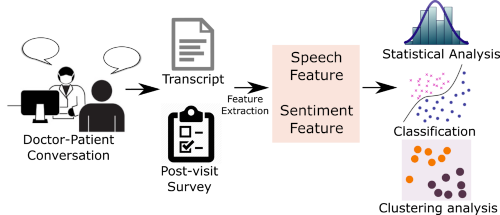
Advanced cancer patients sometimes spend their final days in unnecessary distress while receiving aggressive cancer treatment that is unlikely to work. This sometimes stems from patients having an incorrect understanding of their prognosis. Although studies have identified that effective doctor-patient communication is associated with better patient outcomes, most cancer patients misunderstand their prognosis.
One major problem is: What are the characteristics of an interaction which makes good doctor-patient communication? In our ongoing work, we analyzed 386 conversations of late-stage cancer patients with their doctors.
We then instantiated these findings into a working system–SOPHIE (Standardized Online Patient for Healthcare Interaction Education) using an iterative participatory process, and validated the efficacy of it through a qualitative study with 9 practicing physicians.
Sample Dialogue:
Publications:
T. Sen, M. R. Ali, R. Epstein, P. Duberstein, E. Hoque, “ Modeling Doctor-Patient Communication with Affective Text Analysis ” Affective Computing and Intelligent Interaction (ACII 2017), San Antonio, USA September 2017
M. R. Ali, T. K. Sen, V-D. Nguyen, R. Rawassizadeh, P. Duberstein, R. Epstein, E. Hoque, What Computers Can Teach Us About Doctor-Patient Communication: Leveraging Gender Differences in Cancer Care , 8th International Conference on Affective Computing and Intelligent Interaction (ACII 2019), Cambridge, UK, September 2019
M. R. Ali, T. K. Sen, B. Kane, S. Bose, T. Carroll, R. Epstein, L. Schubert, E. Hoque, Novel Computational Linguistic Measures, Dialogue System and the Development of SOPHIE: Standardized Online Patient for Healthcare Interaction Education , IEEE Transactions on Affective Computing, 2021